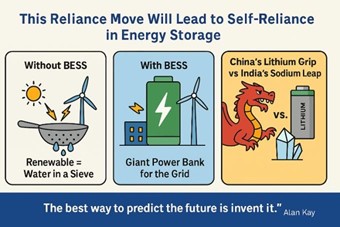



A century after Dandi, sodium teams up with British innovation to strengthen India’s energy storage future.
By Ravishankar Kalyanasundaram
Reliance has recently bought over Faradion, a British company. It is about India breaking into the global race for the future of clean power—salt’s second innings, this time as sodium. At first glance, it may sound like another corporate deal in the crowded energy space. But pause for a moment—this move has the potential to transform India’s renewable energy story. It is not only about a company expanding into a new technology; it is about India breaking into the global race for the future of clean power.
India has raced ahead in building solar parks and wind farms, from Rajasthan’s shimmering deserts to Tamil Nadu’s breezy coasts. Yet the problem is stark: the sun doesn’t shine at night, and the wind doesn’t blow on demand. Power supply and power demand rarely align.
Without storage, renewable power is like water in a sieve—abundant when nature provides, gone when you need it most. That is why Battery Energy Storage Systems (BESS) are critical. Think of them as giant power banks for the national grid. They soak up electricity when renewables overflow and release it when households and factories need power most.
Without BESS, India wastes renewable capacity and falls back on coal for backup. With BESS, the country can unlock round-the-clock green power. Simply put, storage is the missing link that connects the renewable dream to reality.
The government recognizes this gap. Through public–private partnerships, it has begun tendering for BESS projects, much like solar parks in earlier years. The goal is to build 40 GWh of storage by 2030, with pilots already underway in Gujarat, Delhi, and Karnataka.
But here lies the catch. Almost every BESS project today depends on lithium-ion batteries, and nearly every lithium cell is imported from China. Beijing’s grip is formidable: it controls close to 90% of global cell production and dominates the supply chains of lithium, cobalt, and nickel. Global projects—from America to Europe to India—inevitably run through a Chinese factory.
For a nation aspiring to self-reliance in energy, this dependence is untenable.
Reliance’s acquisition of Faradion changes the script. Unlike lithium, sodium is abundant in India—literally in our salt pans and seas. Until recently, the technology to turn sodium into efficient, scalable batteries was locked up in a handful of patents, chiefly in Japan and the UK.
By securing Faradion, Reliance has brought that intellectual property home. It is not just buying a company; it is buying freedom from dependence, buying entry into a global race where India has the chance to lead.
At the 48th AGM, Mukesh Ambani called the company’s new energy push more than business. It is, he said, a mission to make India energy secure and eventually an energy exporter. With sodium-ion, that ambition suddenly looks achievable.
The vision is taking shape at Jamnagar, home to the Dhirubhai Ambani Green Energy Giga Complex. This is not just another factory, it is an ecosystem bringing together solar modules, green hydrogen, fuel cells, and, most crucially, storage.
At its centre stands a 30 GWh advanced battery plant, expandable to 120 GWh, slated to go live in 2025. Scale is the strategy. Jamnagar will not only serve India’s domestic market but also compete globally, offering sodium-ion storage as a credible alternative to China’s lithium-ion dominance.
Reliance’s leap is more than a corporate milestone. It is a strategic turning point for India:
With features of raw material abundance, longevity, and safety, sodium-ion’s promise is enormous. Unlike lithium, which is scarce and geopolitically cornered, sodium is freely available and secure. Its performance in storage applications is robust, its safety profile superior, and its commercial pathway is now clear.
With Reliance securing Faradion’s technology, India is not preparing for a future race—India is already in the race now. By aligning with the UK and Japan, leveraging their research talent and market access, India can turn this lead into a sustained billion-dollar gain and position itself as a dominant global supplier.
A New March for Energy Freedom
In Gujarat, where Mahatma Gandhi in 1930 drew a line in the sands of Dandi, salt now draws new lines on the factory floors of Jamnagar—led by another Gujarati, Mukesh Ambani. This time not defying the British but partnering with British innovators; not seeking independence, but advancing innovation and energy self-reliance. Then, a handful of crystals to claim self-rule; now, sodium cells to strengthen self-reliance. It is a different grammar of nation-building: not defiance but design, not boycott but build. If the science and scale come together, salt’s second innings could help India keep the lights on—cleanly, reliably, and our way.